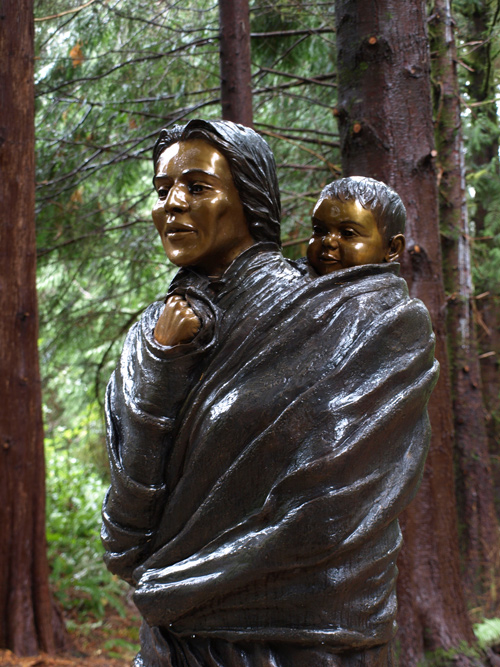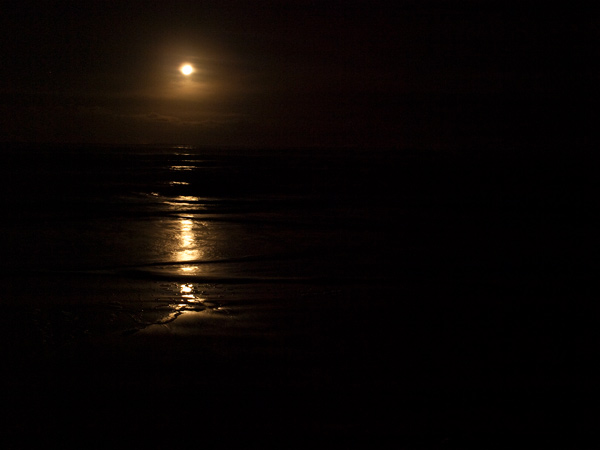At Fort Clatsop, Sacagawea pleads to be permitted to see a beached whale, and her wish is “indulged”. Half-way to the salt works, Clark‘s group—including Sacagawea—have a clear night with a “Shiney” moon. At the fort, Lewis describes the status of Chinookan women and laments the expedition’s paucity of trade goods.
Off to See the Whale
by Yellowstone Public Radio[1]Originally aired weekdays by Yellowstone Public Radio during the Bicentennial observance of 2003-2006. Narrated by Hal Hansen. Scripts by Whit Hansen and Ed Jacobson. Produced by Leni Holliman. © … Continue reading
Sacagawea and Jean Baptiste Charbonneau
© 2008 by Kristopher K. Townsend. Permission to use granted under the Creative Commons Attribution-Share Alike 4.0 International license. Taken with cooperation from Lewis and Clark National Historic Park, Fort Clatsop.
Related: Sacagawea | Jean Baptiste Charbonneau
Sacagawea’s Plea
Capt Clark set out after an early breakfast with the party in two canoes as had been concerted the last evening; Charbono [Toussaint Charbonneau] and his Indian woman [Sacagawea] were also of the party; the Indian woman was very impotunate to be permited to go, and was therefore indulged; she observed that she had traveled a long way with us to see the great waters, and that now that monstrous fish was also to be seen, she thought it very hard she could not be permitted to see either (she had never yet been to the Ocean).
—Meriwether Lewis
The Coastal Indians
The Clatsops, Chinnooks [Chinooks], Killamucks [Tillamooks] &c. are very loquacious and inquisitive; they possess good memories and have repeated to us the names capasities of the vessels &c of many traders and others who have visited the mouth of this river;
—Meriwether Lewis
Respecting Indian Women
notwithstanding the survile manner in which they treat their women they pay much more rispect to their judgment and oppinions in many rispects than most indian nations; their women are permitted to speak freely before them, and sometimes appear to command with a tone of authority; they generally consult them in their traffic and act in conformity to their opinions.
—Meriwether Lewis
Reduced Merchandise
This day I overhalled our merchandize and dryed it by the fire, found it all damp . . . our merchandize is reduced to a mear handfull, and our comfort during our return the next year much depends on it, it is therefore almost unnecessary to add that we much regret the reduced state of this fund.—
—Meriwether Lewis
Full Moon at the Salt Works
© 19 December 2010 by Kristopher K. Townsend. Permission to use granted under the Creative Commons Attribution-Share Alike 4.0 International license.
Shiny Night
in the forks of this Creek we found Some drift pine which had been left on the Shore by the tide of which we made fires. the evening a butifull Clear moon Shiney night, and he 1st fair night which we have had for 2 months
—William Clark
Related: The Salt Works
Weather Diary
aspect of the weather at rise
Wind at rise
Weather at 4 OC. P.M. Wind at 4 OC. P.M. cloudy after rain S E fair E the sun shown about 5 hours this evening & it continued fare during the night.
—Meriwether Lewis and William Clark[2]To assist the reader, the editor of this web page has omitted the “Day of the month” column and spelled out some of the abbreviations.
Experience the Lewis and Clark Trail
The Lewis and Clark Trail Experience—our sister site at lewisandclark.travel—connects the world to people and places on the Lewis and Clark Trail.
Plan a trip related to January 6, 1806:

Fort Clatsop is a High Potential Historic Site along the Lewis and Clark National Historic Trail managed by the U.S. National Park Service. The site is managed by the Lewis and Clark National and State Historic Parks.
Notes
| ↑1 | Originally aired weekdays by Yellowstone Public Radio during the Bicentennial observance of 2003-2006. Narrated by Hal Hansen. Scripts by Whit Hansen and Ed Jacobson. Produced by Leni Holliman. © 2003 by Yellowstone Public Radio. |
|---|---|
| ↑2 | To assist the reader, the editor of this web page has omitted the “Day of the month” column and spelled out some of the abbreviations. |




